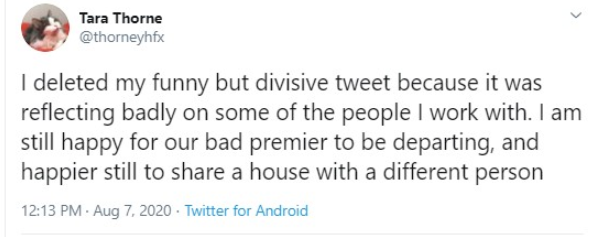How do we balance Tara Thorne’s history of supporting artists and culture in Halifax with what even one of her supporters described as ‘a hurtful and very bad joke tweet’? These days, it seems, we don’t.

I will confess off the top I don’t know the specifics of what freelance arts journalist Tara Thorne tweeted about the premier’s son, but — based on what I read about the now-deleted tweet — I don’t have any interest in seeking it out. What I do know is that Thorne apologized for the tweet twice — once not so much, and a second, more fulsomely — and then not only deleted the tweet but also deactivated her Twitter account.


I also know that, as a result of that one since-deleted tweet, CBC “management” summarily fired her from her long-running weekly freelance arts and culture gig on Information Morning — or, as the official CBC-speak version put it, the corporation decided to “end our business relationship with freelance contributor Tara Thorne follow[ing] serious deliberation and careful consideration.” (It certainly didn’t take the Mother Corp much deliberation or consideration to delete its once-boastful profile of suddenly-former freelance contributor Thorne and redirect Googlers to its generic local news page instead.)
And finally, how could I not help but notice that her firing touched off an angry, hash-tagged, heartfelt, #ImWithThorney tweetstorm that filled screen after screen in my own feed? Scrolling through it is like wandering through a parade of the city’s culturati, almost all singing from the same hymnal of praise for Thorne:

- former Halifax poet laureate Rebecca Thomas (“owe a debt of gratitude to Tara”),
- former Coast news editor Jacob Boon (“no limit to my praise”),
- musician Ben Caplan (“a great journalist and champion of underdogs”),
- former Halifax journalist and now Toronto-based Quill & Quire Editor Sue Carter (“an amazing writer with a unique voice”),
- publicist Trevor Murphy (her firing reflects “a deep lack of understanding of Tara’s important influence”),
- Bus Stop Theatre executive director Sebastien Labelle (“the success of all my work in the arts… has depended on reporting by the too few arts reporters getting the word out there”),
- writer Ryan McNutt (“truly great editor and arts advocate”),
- filmmaker Marc Almon (“a champion of the arts and one of the best writers in Nova Scotia”),
- Zuppa Theatre (“a massive supporter of not just Zuppa but of all types of art and artist”),
- former NDP MP Megan Leslie (“worked tirelessly to promote local artists”),
- current MLAs Lisa Roberts (“so valuable”) and Susan Leblanc (“a fierce and tireless advocate for the cultural community”),
- the Canadian Centre for Policy Alternative’s Christine Saulnier (“a huge loss”),
- former CBC Mainstreet host and author Stephanie Domet (“the decision CBC made — at whatever level it was made — is bullshit”), and
- former Information Morning host Don Connolly, who apparently told Frank Magazine Thorne’s tweet may have been “inappropriate” and a “mistake…” but “does it merit the CBC cutting ties with her? I would think not.”
… Well, you get the picture.
I’m with Connolly. And with #ImWithThorney.

Tara Thorne has long been an edgy, over-the-top, one-of-a-kind, occasionally polarizing, always entertaining Halifamous cultural tour de force. For more than two decades, she’s covered arts and popular culture in this city with her uniquely “Thorne-y” perspective, including as both the former arts and entertainment editor of The Coast and also — until undone by her recent tweet — a weekly commentator for Information Morning.
Thorne used those high-profile pulpits not only to promote otherwise under-appreciated local artists, musicians and filmmakers — see above — but also to call out those in the arts business she found wanting.
Last month, for the latest example, she covered the East Coast Music Awards, tweeting after it was over: “There were 10 more ECMAs handed out tonight—8 to men and 1 to decades-long Ontario resident Natalie MacMaster. So in total, that’s 28 ECMAs for music and 24.5 were awarded to men.” Vintage Tara Thorne. Acerbic. On the money.
So… how do we balance Tara Thorne’s long and exemplary history of supporting artists and culture in Halifax with what even one of her supporters described as “a hurtful and very bad joke tweet”?
The reality is that it’s become harder and harder to find balance — or nuance of any sort — in our increasingly polarized, rush-to-judgment world. It’s a phenomenon that cuts across the usual right-left divides but is often exacerbated by them.
The new default position, including perhaps especially among risk-averse employers and organizations, seems to be to rush immediately to the extreme.
Consider just a few recent non-local examples.
In June, the New York Times editorial page editor, James Bennet, was forced to resign after his opinions section published an op-ed by Republican Senator Tom Cotton calling for military intervention in US cities where citizens were protesting against police brutality and systemic racism following the death of George Floyd.
Dozens of Times staffers spoke out on Twitter… to denounce their newspaper’s decision to run the essay shortly after it appeared online, calling it inflammatory and saying it contained assertions debunked as misinformation by the Times’s own reporting; [800] later signed a letter objecting to it.
During a virtual all-staff meeting, Bennet apologized, acknowledging the piece had not been edited carefully enough and should not have been published. That wasn’t enough to save his job. Although he officially resigned, it was clear he was pushed. Declared published A. G. Sulzberger: “Both of us concluded that James would not be able to lead the team through the next leg of change that is required.”
So, who was James Bennet before he was no longer? A veteran Times reporter, a former White House correspondent and Jerusalem bureau chief, he’d been the paper’s editorial page editor since 2016. Sulzberger acknowledged Bennet had broadened the ranks of columnists at the paper and “re-invigorated the staff-written editorials to lead crusades on issues such as privacy and economic inequality.” One of his editorial writers won a Pulitzer prize for a series on race.
One of Bennet’s few defenders, Times national reporter Farah Stockman who herself won a Pulitzer for commentary while at the Boston Globe, tweeted after Bennet’s resignation: “I will always remember him as the editor who gave Ta-Nehisi Coates the space to write the ground-breaking case for Reparations . . . when few would entertain the idea. That’s the James Bennet I know.”
Before the events of June, Bennet was considered a likely candidate to become the paper’s executive editor in a few years. Now, he’s gone.
And then there is this, a non-journalism-related example of current historical revisionism that could have contemporary resonance in Canada.
In July, Planned Parenthood of New York announced it intended to remove the name of its founder, Margaret Sanger, from its Manhattan clinic and lobby to change a street sign in the city honouring “Margaret Sanger Square.” These moves, and others, are part of what has been described as “organizational shifts” in the Planned Parenthood organization, seemingly to cleanse Sanger’s memory from the organization she founded.
An early feminist activist, Sanger is widely regarded as a pioneer in American reproductive rights. She opened the first birth control clinic in the United States more than a century ago, and helped create access to birth control for low-income, minority and immigrant women… Sanger worked with black leaders and ministers to give black women the same access to birth control as white women, [according to Esther Katz, founder of the Margaret Sangers Papers Project]. She was single-mindedly focused on making birth control cheap and accessible to everybody.
But then too, there is this:
She was also a vocal supporter of the now-discredited eugenics movement, which aimed to improve the human race through planned breeding based on genetic traits.
While now rightly discredited, eugenics — the notion that “society could be improved by encouraging reproduction among certain groups, particularly Anglo-Saxon Protestants, and discouraging or limiting reproduction among other groups, including Eastern European immigrants and, increasingly, Indigenous people” — was also considered a “progressive” idea in Canadian socialist and feminist circles in the early twentieth century.
Among the iconic Canadian figures who at least briefly flirted with the idea of sterilizing “mental defectives and those incurably diseased:” Nellie McClung, the suffragette leader and member of the “Valiant Five” who helped establish that women were legally “persons” and “could no longer be denied rights based on narrow interpretations of the law;” and Tommy Douglas, the CCF premier of Saskatchewan who is best known as the father of Medicare in this country and who was chosen as “The Greatest Canadian” in a 2004 CBC-TV series.
Should they now be “canceled,” their very real and significant achievements disappeared in a binary choice between good and evil, right and wrong in which wrong and evil inevitably trump good and right?
While that may seem — is — a long way from the firing of one freelance Halifax arts journalist, the CBC’s decision to “end our business relationship” with Tara Thorne reflects a reflexive unwillingness to confront nuance and balance that has become all too common these days.
The CBC, which has been rightly criticized for its past failures to respond appropriately to the serial inappropriate behaviours of stars like Jian Ghomeshi and Don Cherry, seems to have settled on a new fault-free default position. One mistake and gone…
Goodbye Tara Thorne.
But as my colleague, Suzanne Rent, summed it up nicely in Wednesday’s Morning File:
What Thorne brought to the arts scene in the city and her promotion of the artists themselves far outweighed one bad tweet. And if it doesn’t, many of us could be one bad tweet away from trouble.
We could be. We are.
A version of this column originally appeared in the Halifax Examiner.
To read the latest column, please subscribe.







 STEPHEN KIMBER, a Professor of Journalism at the University of King's College in Halifax and co-founder of its MFA in Creative Nonfiction Program, is an award-winning writer, editor and broadcaster. He is the author of two novels and eight non-fiction books. Buy his books
STEPHEN KIMBER, a Professor of Journalism at the University of King's College in Halifax and co-founder of its MFA in Creative Nonfiction Program, is an award-winning writer, editor and broadcaster. He is the author of two novels and eight non-fiction books. Buy his books
Tara Thorne was by no means the voice of arts in Halifax.
She was a 90’s trendy demagogue who gleefully snubbed anyone who didn’t kiss her butt or fit into her cool kid community. I’m so very glad she’s gone.
Thoughtful and eloquently argued, but with one glaring research hole; you didn’t actually see the original Tweet. Whether it would change your opinion or not, it’s impossible to make these comparisons without fully understanding what you’re comparing them to.